While a kind woman named Giorgina was taking a walk along the beach, she saw a heartbreaking scene.
A sweet western pedigree pup was sitting in the trash. With eyes filled with sadness, the doggo was looking at the passers-by as if she begged them for help.
The moment Giorgina noticed the canine, she felt compelled to rush to her aid.
After the woman approached her, she was surprised to realize that the pup wasn’t alone. There were three little newborn puppies huddled next to their mom.
Although the abandoned canine family needed just a little bit of compassion, many people ignored them, passing them by.
The Mama Dog Breathes A Sigh Of Relief
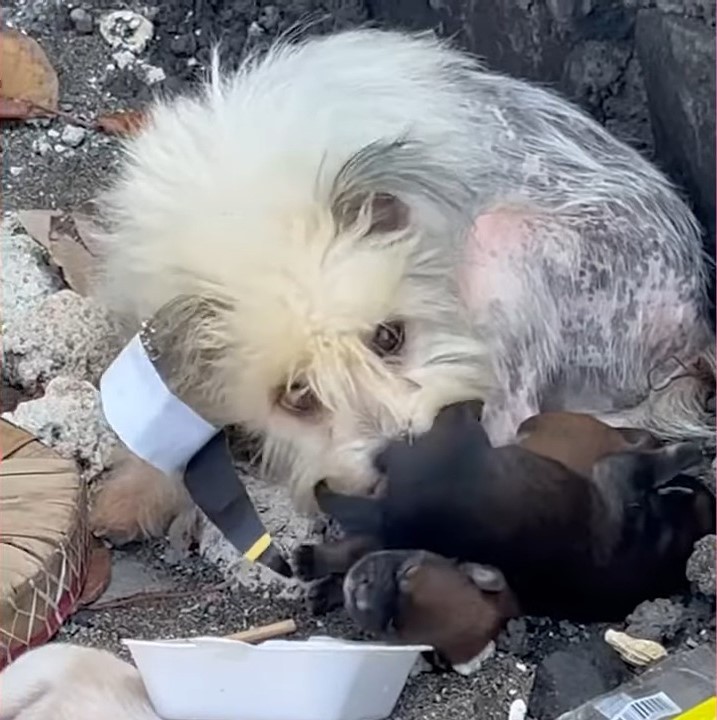
The sad mama, later named Indah, was taking care of her babies. She planted many kisses on their adorable faces, giving them all her love.
After Indah saw Giorgina, her face lit up. The mother dog was glad that someone finally noticed them.
Giorgina talked to the locals, and she found out that Indah’s owners dumped her and the babies the night before.
The giant-hearted woman immediately took the lovely family to the vet, where they were given a complete medical checkup.
Indah was diagnosed with a skin condition, and she began receiving treatment. Her babies were in excellent health, thanks to the wonderful care of their mama.
Giorgina reached out to many shelters, trying to find help for Indah and her family but all shelters were full.
Luckily, Mission Paws’ible, the charity organization that helps homeless dogs, stepped in and took the pups under their care.
Receiving A Ton Of Love
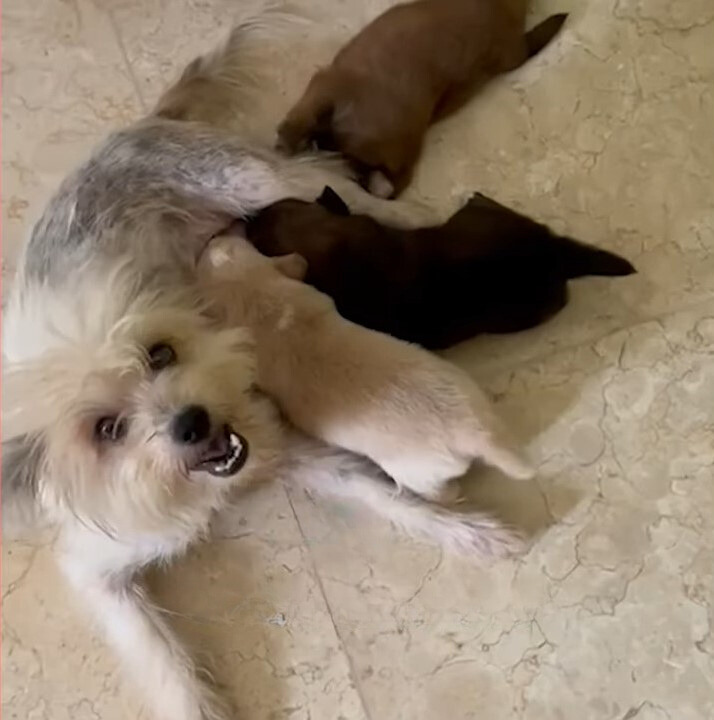
Prue Barber, the founder of the organization, found them a loving foster home.
Indah was overjoyed to move in with Bea, her foster mom, who received the canine family with outstretched arms and a lot of love.
The mama dog kept smiling from ear to ear and wagging her tail.
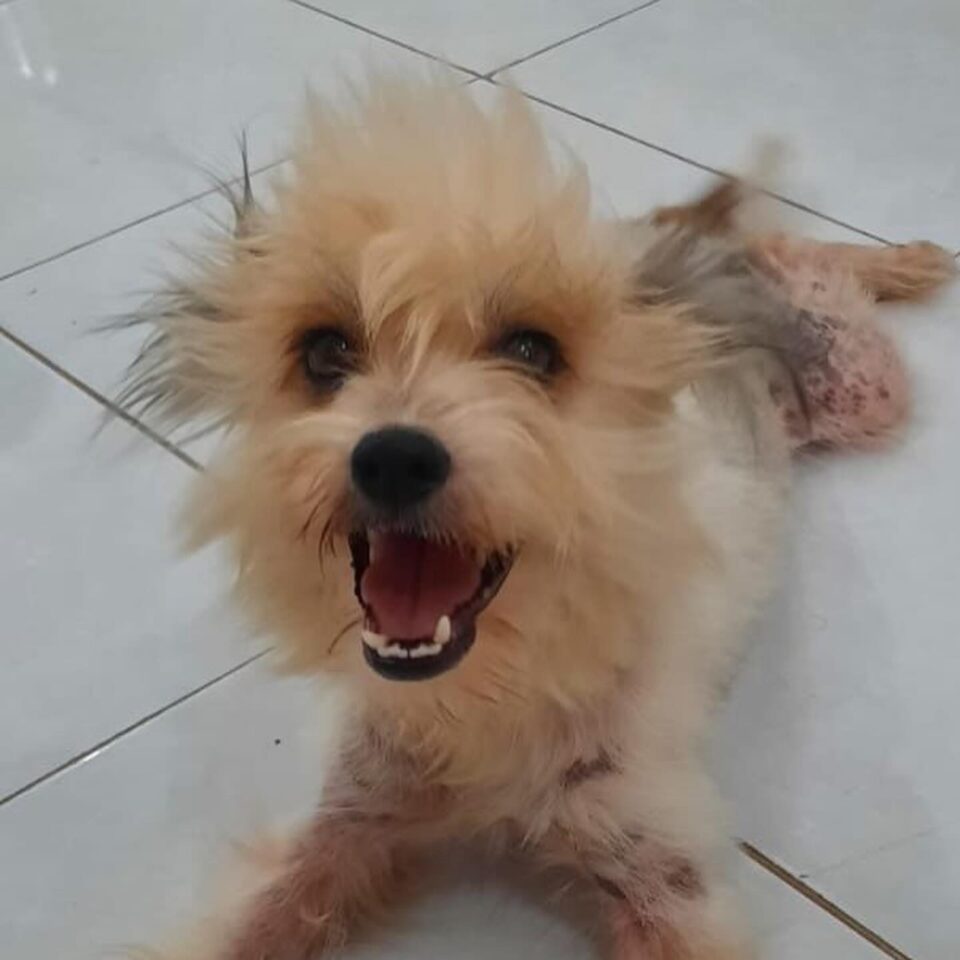
“Indah’s bond with Bea, her foster carer, was immediate. She trusted whoever was around her,” Prue told Cuddle Buddies.
Indah’s puppies, named Bobby, Jack, and Biji, enjoyed their time in the foster home. The babies felt safe, and they soaked up all their mom’s love.
Despite being betrayed by humans, both Indah and her babies were extremely affectionate toward everyone they met.
The adorable mama relished watching her babies thrive. They started running and playing in the yard. The delightful furballs were full of energy.
Starting A BrandNew Life
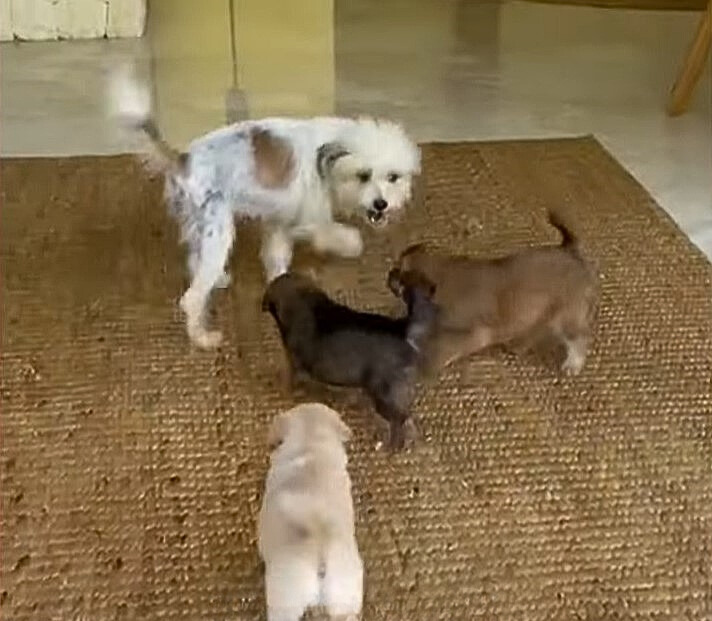
Indah felt that it was time to let her puppies start the most important chapter in their lives. They began searching for their forever families.
It didn’t take long for the three babies to find their happily ever after.
Their mama moved to another foster home. She made a full recovery, and her beautiful white fur regrew.
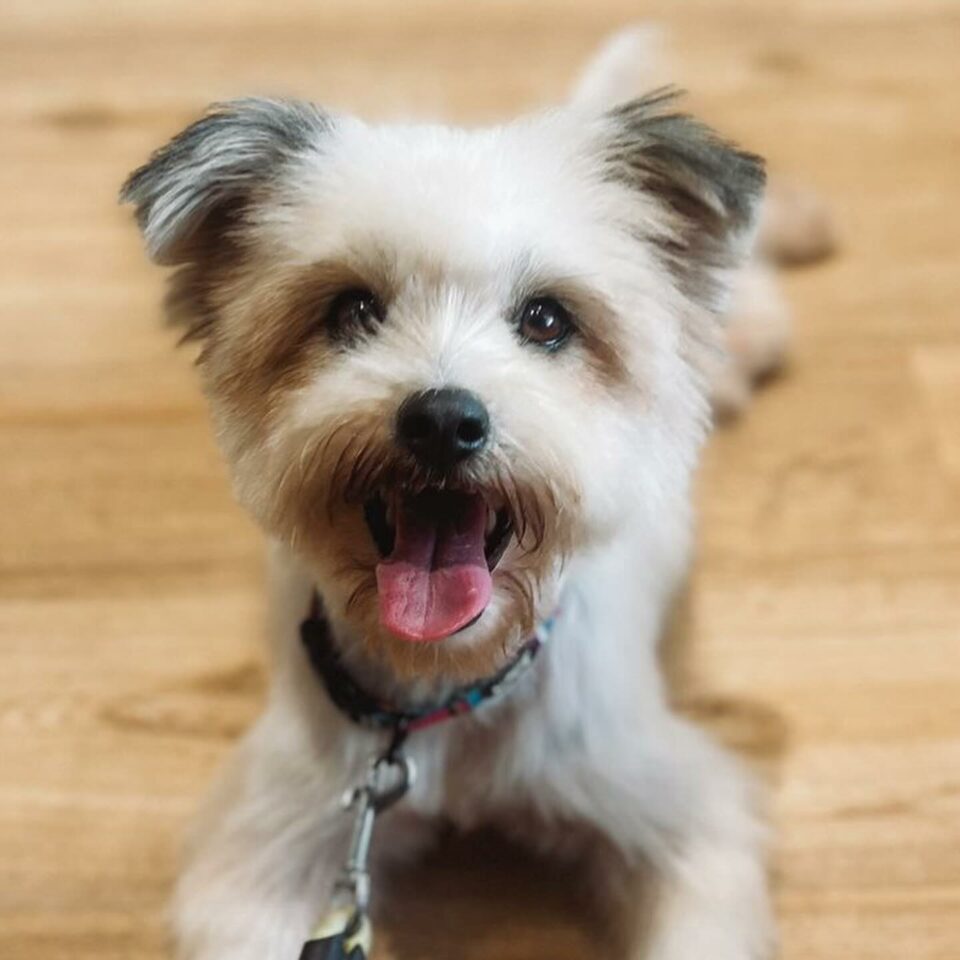
Although Indah is still waiting for her forever family, she enjoys her life to the fullest.
The wonderful canine can’t stop smiling and wagging her tail.
“…Indah’s absolutely loving life. She gets daily walks, she gets cuddles on the couch,” Prue added.
I hope that Indah will soon meet her perfect family who will dote on her and adore her like she deserves.
The brave mama deserves all the happiness in this world.
Ever caught your furry friend indulging in a rather unsavory snack? It’s a common sight that can leave you both puzzled and slightly grossed out. Dogs eating their own poop, known as coprophagia, might seem like a bizarre habit, but there’s more to it than meets the eye. As a seasoned dog enthusiast, you’ve probably encountered this behavior before and wondered about the reasons behind it.
You’ve seen your canine companion exhibit all sorts of quirky behaviors, but this one takes the cake. Before you jump to conclusions or start feeling queasy, let’s take a closer look at what drives dogs to engage in this peculiar habit. It’s a topic that sparks curiosity and concern among pet owners, and understanding the root causes can shed light on this not-so-appetizing behavior.
Understanding Coprophagia in Dogs
The Basics of Canine Behavior
Dogs are fascinating creatures with unique behavior patterns. Their instinctual habits are often influenced by factors such as past associations, environment, and natural instincts. Understanding these basics of canine behavior can shed light on why dogs engage in certain behaviors like coprophagia.
Common Misconceptions
There are misconceptions surrounding why dogs eat their own feces. Contrary to popular belief, this behavior is not always a sign of nutritional deficiency. While diet can play a role in coprophagia, it’s essential to recognize that other reasons, such as stress, boredom, or seeking attention, can also contribute to this behavior. Addressing these misconceptions can help you better tackle coprophagia in your furry companion.
Health and Nutritional Causes
Poor Digestion and Nutrient Absorption
If your dog eats his own poop, it could be due to poor digestion and nutrient absorption. Sometimes, the food your dog eats may not be fully digested, leading him to try to re-consume it to extract more nutrients. Inadequate digestion can result from various factors like sensitive stomachs or fast eating habits. Ensuring your dog has a balanced diet and monitoring his eating pace can help improve digestion and reduce the urge to consume feces.
Intestinal Parasites and Diseases
Intestinal parasites or underlying health conditions can also trigger coprophagia in dogs. Worms or other parasites can interfere with your dog’s gastrointestinal system, causing him to seek relief by eating feces. Additionally, diseases like diabetes or conditions affecting the pancreas can impact nutrient absorption, prompting dogs to resort to consuming stools. Regular veterinary check-ups and preventative measures against parasites can help address this issue.
Dietary Deficiencies
If your dog lacks essential nutrients in his diet, he may resort to eating feces to compensate for the deficiency. A diet deficient in vitamins, minerals, or proteins can drive dogs to seek alternative sources of nutrition, including fecal matter. Providing a well-balanced diet suitable for your dog’s age, size, and breed is crucial in preventing dietary deficiencies that may lead to coprophagia. Consulting a veterinarian for dietary recommendations can help address any nutrient gaps in your dog’s meals.
Behavioral and Psychological Factors
Puppy Exploration and Learning
When puppies are in the exploration phase and learning about their environment, they tend to investigate everything, including their feces. This behavior is normal for puppies as they use their mouths to explore the world around them. Eating their feces during this stage could be a result of their natural curiosity and learning process. It’s essential to teach puppies proper behavior from a young age to prevent this habit from becoming ingrained.
Stress and Anxiety-Related Issues
Stress and anxiety can also contribute to a dog eating its own feces. Dogs, like humans, can experience stress in various situations, such as changes in their environment, routine, or interactions with other animals. When a dog feels anxious or stressed, they may engage in coprophagia as a coping mechanism. Understanding your dog’s triggers and providing a safe and comforting environment can help reduce this behavior.
Attention-Seeking Behaviors
Dogs are social animals that thrive on attention from their owners. If a dog feels neglected or lacks mental stimulation, they may resort to eating their feces to gain attention. This behavior can be a cry for interaction and engagement. Spending quality time with your dog, providing mental and physical stimulation, and reinforcing positive behaviors can help curb attention-seeking coprophagia.
Environmental and Contextual Influences
Limited Access to Food and Clean Areas
If your dog doesn’t have constant access to food or lives in an unclean environment, it might resort to eating its feces out of necessity or a desire for a cleaner space. Making sure your dog has regular meals and a clean living area can help deter this behavior.
Observational Learning from Other Dogs
Dogs are known to mimic behaviors they observe in other dogs. If your furry friend sees another dog eating feces, it may imitate this behavior out of curiosity or a sense of “normalcy.” Keeping your dog away from such influences can prevent it from picking up this habit.
How to Discourage Poop Eating in Your Dog
Proper Nutrition and Health Checks
Ensure your dog’s diet is well-balanced and meets their nutritional needs to discourage poop eating. Consult your vet for dietary recommendations tailored to your dog’s health and well-being. Regular health check-ups can identify any underlying health issues that may contribute to coprophagia.
Training and Positive Reinforcement
Implement training techniques that discourage poop eating and reinforce positive behaviors. Use commands like “leave it” or “drop it” to redirect your dog’s attention. Reward your dog with treats or praise when they listen to commands and avoid eating feces. Consistent training and positive reinforcement can help break this habit.
Environmental Enrichment and Mental Stimulation
Provide your dog with a stimulating environment to prevent boredom and reduce the likelihood of poop eating. Offer interactive toys, playtime, and regular exercise to keep your dog mentally engaged. Create a enriching living space that includes activities to keep your dog stimulated and fulfilled, reducing the urge to consume feces.
When to Seek Professional Help
Consulting a Veterinarian
If your dog’s poop-eating behavior persists despite your efforts to address it through diet changes, training, and environmental adjustments, it’s time to consult a veterinarian. A veterinarian can conduct a thorough examination to rule out any underlying health issues causing this behavior. They will also provide tailored advice and medical solutions to help curb this habit effectively.
Working with an Animal Behaviorist
When conventional methods have not yielded results in stopping your dog from eating poop, seeking help from an animal behaviorist can offer a fresh perspective. An animal behaviorist can analyze your dog’s specific behavior patterns and create a customized behavior modification plan. With their expertise, they can identify triggers, implement targeted training techniques, and provide guidance on how to reinforce positive behaviors, helping your dog overcome this undesirable habit.
Conclusion
So, there you have it – the reasons why your dog might be munching on his own poop. Remember, a balanced diet and keeping an eye on his habits are key. If the behavior continues, don’t hesitate to reach out to your vet for help. They can rule out any underlying health issues. And if traditional methods don’t work, an animal behaviorist could be your next best bet. Keep an eye on your furry friend, and with a bit of patience and the right guidance, you can help curb this not-so-appetizing habit.
Frequently Asked Questions
Why do dogs eat poop?
Dogs may eat poop due to stress, boredom, or poor digestion. A balanced diet, monitoring eating habits, and veterinary advice can help curb this behavior. Training and environmental enrichment can also discourage poop consumption.
When should I seek professional help for my dog’s coprophagia?
If your dog continues to eat poop despite efforts, consult a veterinarian to rule out any health issues. Consider working with an animal behaviorist for tailored behavior modification plans if conventional methods fail.
[no_toc]

Hey there, I’m Janet Brooks, a dog-loving student from California. I’m all about helping pups in need, especially those without homes. Me and my awesome friends work together to give shelter and love to stray dogs. Oh, and I also write blogs about dogs to share helpful info.